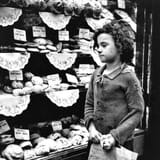Search Results
7/21/2025, 11:47:16 PM
London, 1910...
On a biting winter morning in Whitechapel, an eight-year-old girl named Eleanor Graves stood each day in front of a bakery window. Her curls were tangled, her fingers raw from the cold, and her patched dress hung loosely over thin limbs. Pressed to her chest was an empty cloth bag—hope wrapped in silence. Behind the glass, golden loaves, warm buns, and jam tarts glistened in the early light. But Eleanor had no pennies. No food. No future. Her father, an Irish laborer, had died in a scaffolding collapse. Her mother worked long hours at the washhouse, scrubbing strangers’ clothes. Yet the deepest ache wasn’t in her belly—it was in the quiet realization that some children were born with everything, while others were born with nothing but hunger.
And so Eleanor made herself a promise. She would learn to read. She would find a way out—not just for herself, but for every child like her. With newspapers scavenged from gutters and alleys, she taught herself letters. A parish priest noticed the curious girl with the fierce eyes and found her a place at the local church school. There, Eleanor discovered a worn anatomy book and fell in love with the idea of healing. She dreamed not of riches or comfort, but of relief—of lifting small bodies out of pain. In 1923, with a scholarship and the stubbornness of the forgotten, she entered university. As a poor girl in a man’s world, she was mocked, ignored, dismissed. But she endured. In 1930, she became a pediatrician, dedicating her life to combating childhood malnutrition.
Years later, known simply as Dr. Graves, she ran a modest clinic in Mayfair by day and returned to East London by night, her satchel filled with medicine, bread, and second-hand coats. She never married, never vacationed, never saved. “I can't change the world,” she once whispered to a student, “but I can change the night of a child.” Her charity, The Bread of Dreams, provided free meals and medical care to thousands.
On a biting winter morning in Whitechapel, an eight-year-old girl named Eleanor Graves stood each day in front of a bakery window. Her curls were tangled, her fingers raw from the cold, and her patched dress hung loosely over thin limbs. Pressed to her chest was an empty cloth bag—hope wrapped in silence. Behind the glass, golden loaves, warm buns, and jam tarts glistened in the early light. But Eleanor had no pennies. No food. No future. Her father, an Irish laborer, had died in a scaffolding collapse. Her mother worked long hours at the washhouse, scrubbing strangers’ clothes. Yet the deepest ache wasn’t in her belly—it was in the quiet realization that some children were born with everything, while others were born with nothing but hunger.
And so Eleanor made herself a promise. She would learn to read. She would find a way out—not just for herself, but for every child like her. With newspapers scavenged from gutters and alleys, she taught herself letters. A parish priest noticed the curious girl with the fierce eyes and found her a place at the local church school. There, Eleanor discovered a worn anatomy book and fell in love with the idea of healing. She dreamed not of riches or comfort, but of relief—of lifting small bodies out of pain. In 1923, with a scholarship and the stubbornness of the forgotten, she entered university. As a poor girl in a man’s world, she was mocked, ignored, dismissed. But she endured. In 1930, she became a pediatrician, dedicating her life to combating childhood malnutrition.
Years later, known simply as Dr. Graves, she ran a modest clinic in Mayfair by day and returned to East London by night, her satchel filled with medicine, bread, and second-hand coats. She never married, never vacationed, never saved. “I can't change the world,” she once whispered to a student, “but I can change the night of a child.” Her charity, The Bread of Dreams, provided free meals and medical care to thousands.
Page 1
